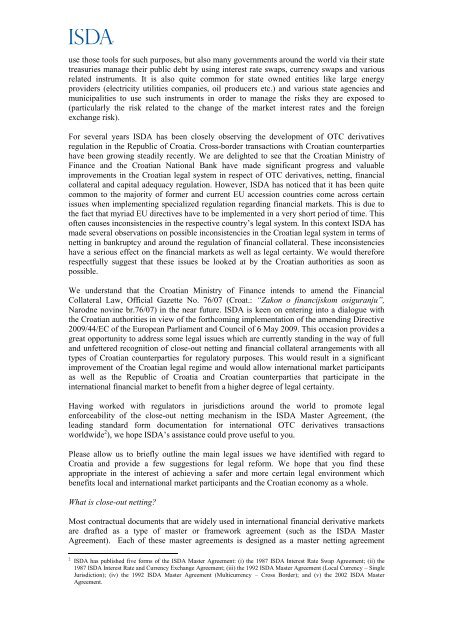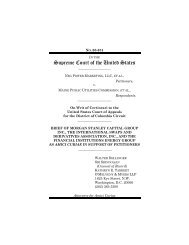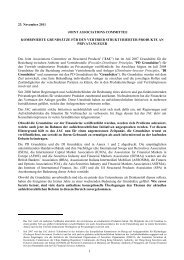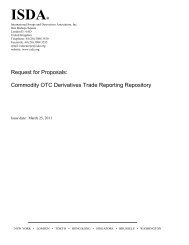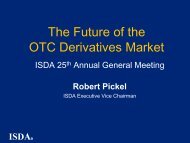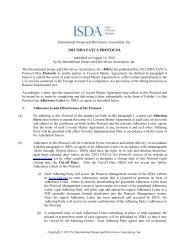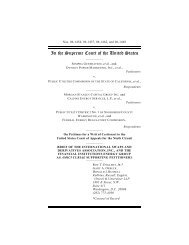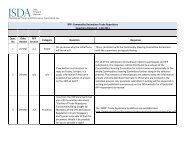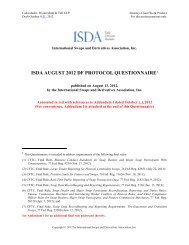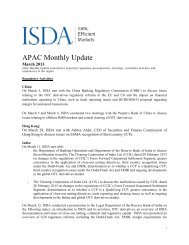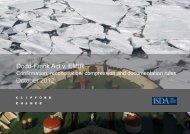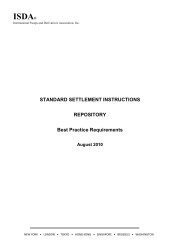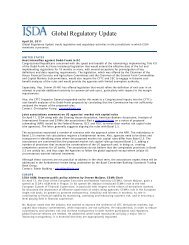24.06. 2011 Ministarstvo financija Republike Hrvatske mr.sc ... - ISDA
24.06. 2011 Ministarstvo financija Republike Hrvatske mr.sc ... - ISDA
24.06. 2011 Ministarstvo financija Republike Hrvatske mr.sc ... - ISDA
- No tags were found...
You also want an ePaper? Increase the reach of your titles
YUMPU automatically turns print PDFs into web optimized ePapers that Google loves.
use those tools for such purposes, but also many governments around the world via their statetreasuries manage their public debt by using interest rate swaps, currency swaps and variousrelated instruments. It is also quite common for state owned entities like large energyproviders (electricity utilities companies, oil producers etc.) and various state agencies andmunicipalities to use such instruments in order to manage the risks they are exposed to(particularly the risk related to the change of the market interest rates and the foreignexchange risk).For several years <strong>ISDA</strong> has been closely observing the development of OTC derivativesregulation in the Republic of Croatia. Cross-border transactions with Croatian counterpartieshave been growing steadily recently. We are delighted to see that the Croatian Ministry ofFinance and the Croatian National Bank have made significant progress and valuableimprovements in the Croatian legal system in respect of OTC derivatives, netting, financialcollateral and capital adequacy regulation. However, <strong>ISDA</strong> has noticed that it has been quitecommon to the majority of former and current EU accession countries come across certainissues when implementing specialized regulation regarding financial markets. This is due tothe fact that myriad EU directives have to be implemented in a very short period of time. Thisoften causes inconsistencies in the respective country’s legal system. In this context <strong>ISDA</strong> hasmade several observations on possible inconsistencies in the Croatian legal system in terms ofnetting in bankruptcy and around the regulation of financial collateral. These inconsistencieshave a serious effect on the financial markets as well as legal certainty. We would thereforerespectfully suggest that these issues be looked at by the Croatian authorities as soon aspossible.We understand that the Croatian Ministry of Finance intends to amend the FinancialCollateral Law, Official Gazette No. 76/07 (Croat.: “Zakon o financijskom osiguranju”,Narodne novine br.76/07) in the near future. <strong>ISDA</strong> is keen on entering into a dialogue withthe Croatian authorities in view of the forthcoming implementation of the amending Directive2009/44/EC of the European Parliament and Council of 6 May 2009. This occasion provides agreat opportunity to address some legal issues which are currently standing in the way of fulland unfettered recognition of close-out netting and financial collateral arrangements with alltypes of Croatian counterparties for regulatory purposes. This would result in a significantimprovement of the Croatian legal regime and would allow international market participantsas well as the Republic of Croatia and Croatian counterparties that participate in theinternational financial market to benefit from a higher degree of legal certainty.Having worked with regulators in jurisdictions around the world to promote legalenforceability of the close-out netting mechanism in the <strong>ISDA</strong> Master Agreement, (theleading standard form documentation for international OTC derivatives transactionsworldwide 2 ), we hope <strong>ISDA</strong>’s assistance could prove useful to you.Please allow us to briefly outline the main legal issues we have identified with regard toCroatia and provide a few suggestions for legal reform. We hope that you find theseappropriate in the interest of achieving a safer and more certain legal environment whichbenefits local and international market participants and the Croatian economy as a whole.What is close-out netting?Most contractual documents that are widely used in international financial derivative marketsare drafted as a type of master or framework agreement (such as the <strong>ISDA</strong> MasterAgreement). Each of these master agreements is designed as a master netting agreement2 <strong>ISDA</strong> has published five forms of the <strong>ISDA</strong> Master Agreement: (i) the 1987 <strong>ISDA</strong> Interest Rate Swap Agreement; (ii) the1987 <strong>ISDA</strong> Interest Rate and Currency Exchange Agreement; (iii) the 1992 <strong>ISDA</strong> Master Agreement (Local Currency – SingleJurisdiction); (iv) the 1992 <strong>ISDA</strong> Master Agreement (Multicurrency – Cross Border); and (v) the 2002 <strong>ISDA</strong> MasterAgreement.


